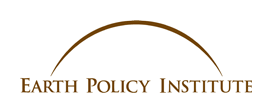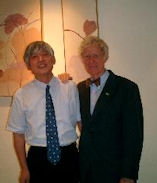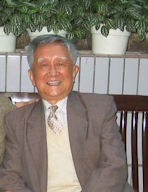Tuesday, March 30, 2010
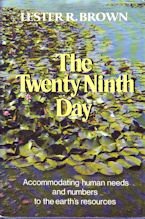 South Korea has long taken the books of Lester Brown to heart. It started in 1980 with a young man named Yul Choi, who was one of the leaders of the democratization movement in South Korea. In jail for his pro-democratic activities, he read The 29th Day, a book Lester had written in 1978. He vowed then that if the democratization movement succeeded, he would use the energies of this student movement to save Korea’s environment.
South Korea has long taken the books of Lester Brown to heart. It started in 1980 with a young man named Yul Choi, who was one of the leaders of the democratization movement in South Korea. In jail for his pro-democratic activities, he read The 29th Day, a book Lester had written in 1978. He vowed then that if the democratization movement succeeded, he would use the energies of this student movement to save Korea’s environment.  Six years and a number of other environmental books later, he founded the first environmental NGO in South Korea: the Korean Research Institute of Environmental Problems (KRIEP). Due to KRIEP’s efforts, environmental issues became a major platform for the democracy movement, paving the way for a civilian government. In 1988, KRIEP merged with two other environmental groups, becoming KAPMA (Korean Anti-Pollution Movement Association) with Mr. Choi as its president. Nuclear waste was a big issue.
Six years and a number of other environmental books later, he founded the first environmental NGO in South Korea: the Korean Research Institute of Environmental Problems (KRIEP). Due to KRIEP’s efforts, environmental issues became a major platform for the democracy movement, paving the way for a civilian government. In 1988, KRIEP merged with two other environmental groups, becoming KAPMA (Korean Anti-Pollution Movement Association) with Mr. Choi as its president. Nuclear waste was a big issue.
With the environmental movement engaged, there was also the need for environmental information. A South Korean publishing company called Earth Love Publications recognized the value of global environmental information and began publishing books by Lester in 1990.
In 1993, KAPMA united with seven local environmental groups to launch the Korean Federation for Environmental Movement (KFEM), and Mr. Choi became its first and present secretary general. 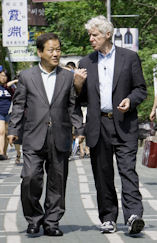
KFEM is the largest and most influential NGO in South Korea, with 85,000 members and 47 local branches working on a variety of environmental, human rights, and economic issues. For his incredible work, Mr. Choi was awarded the Goldman Environmental Prize in 1995. 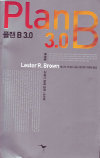 Dedicated to environmental literacy, KFEM publishes a magazine and books through its publishing house Doyosae. Mr. Choi had met with Lester a number of times when he had visited the United States. Thus, when we started Earth Policy Institute, it was a natural for us to approach Doyosae, which enthusiastically agreed to publish our books—and has been doing so ever since. Under Mr. Choi’s direction, Lester has traveled several times to South Korea to speak, meet with political leaders, and launch his books. Conversely, when Mr. Choi is in the United States, he takes time to meet with Lester.
Dedicated to environmental literacy, KFEM publishes a magazine and books through its publishing house Doyosae. Mr. Choi had met with Lester a number of times when he had visited the United States. Thus, when we started Earth Policy Institute, it was a natural for us to approach Doyosae, which enthusiastically agreed to publish our books—and has been doing so ever since. Under Mr. Choi’s direction, Lester has traveled several times to South Korea to speak, meet with political leaders, and launch his books. Conversely, when Mr. Choi is in the United States, he takes time to meet with Lester.
The two men share a strong mutual admiration for each other's work. When Mr. Choi started the Korea Green Foundation in 2002 to focus on developing solutions to environmental and social issues and to foster cooperation among government, corporations, civic organizations, and individuals, Lester agreed to be an advisor.
In 2008 Lester was in Seoul to launch the Korean edition of Plan B 3.0. Mr. Choi put together a program that included a press conference in the airport when Lester arrived, three major speaking events, exceptional media coverage,and meetings with the mayors of Seoul and Incheon City.
Sincerely,
Reah Janise Kauffman
Vice President
Tuesday, March 16, 2010
Lester Brown’s first book, Man, Land and Food, was published in 1963. Since then, he has authored 15 additional books and co-authored another 35 (not including his numerous monographs). Each book has been translated into at least one other language, often many more, so that his books can be found in some 44 languages.
Some of the languages in which he has long been published are Japanese and Chinese. The reason for both relate to an individual or individuals in each country.
Japan
In 1984, concerned about the need for solid environmental information in Japan, Soki Oda, an editor at the time, purchased the rights to publish State of the World 1984 and then found a publisher, Diamond Sha. Over the years, he became so involved with disseminating environmental information, especially because global environmental information was so lacking in Japan, that he established an organization, World Watch Japan, to promote the Institute’s research there.
When Lester founded Earth Policy Institute, Soki bid for the rights to publish our books in Japan, starting in 2001 with Eco-Economy: Building an Economy for the Earth. In addition to publishing and marketing, Soki also arranges book promotional tours that often generate exceptional media coverage.
Lester has been on prime time television on numerous occasions in Japan as well. In November 2008, NHK, Japan’s major media network, conducted a two-hour interview with him for a New Year’s program they were doing on the future. Unbeknownst to us, the 90-minute program was solely on the solutions he described in his Plan B book series. The program has aired a number of times since January 2009.
Japan is the only country that has published a book written by Lester that has not been published elsewhere. There isn't even an English edition. Eko Keizei Kakumei: Environmental Trends Reshaping the Global Economy was published in 1998 by Tachibana Publishing through the team efforts of Junko Edahiro, then an interpreter, and Peter David Pedersen then with BC Consulting. Peter David now heads E-Square Inc. Junko, who was Lester’s main interpreter when he visited Japan, is now a well-known author in her own right and heads her own environmental NGO, Japan for Sustainability, and Change Agent, Inc. which conducts seminars on systems thinking. Junko edited the book, drawing on Lester’s lectures and on interviews she conducted with him. The book became a Top Ten bestseller in Japan.
China
In China, Lin Zixin, formerly with the Institute of Scientific and Technological Information of China (ISTIC), has arranged the publication of Lester’s books in Chinese for more than 20 years. Mr. Lin retired from ISTIC at about the same time that we established Earth Policy Institute. Thus, when we were interested in a Chinese publisher, we looked to Mr. Lin, who not only found a publisher for Eco-Economy, but personally led the team of translators and arranged outreach. Part of the outreach for the Chiinese edition included a trip to Inner Mongolia and Gansu provinces that helped Lester better understand the pressures on the land in China’s northwest, information that fueled subsequent books.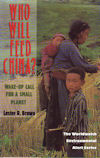
Meanwhile, the Chinese edition of Plan B received a coveted national book award in 2005 from the National Library of China. And both Premier Wen Jiabao and Pan Yue, Deputy Minister of the State Environmental Protection Administration, have quoted Plan B 2.0 in public addresses and articles.
In late May and early June, Lester will be in both countries to promote the Japanese and Chinese editions of Plan B 4.0: Mobilizing to Save Civilization. See our Events page for details as they unfold.
Sincerely,
Reah Janise Kauffman
Vice President
Tuesday, March 02, 2010
From March 16-28, Washington, DC, will be the site of the Washington, DC 18th Annual Environmental Film Festival, offering some 150 films. That so many cities and universities host environmental film festivals says much about how hungry people are for environmental information—and film is such a marvelous medium for information.
In the rich diversity of films being aired here later this month are those just about our natural world such as beetles, bears, and gorillas; exotic lands like Bhutan, the Amazon, and Yellowstone; and even the soil that sustains us. Others examine food, where it comes from, the seeds that grow it, and how we eat it. And some films simply entertain us such as Up and Mon Oncle by Jacques Tati.
Each year our staff members pour through the Festival guide, marking off the films they will see. 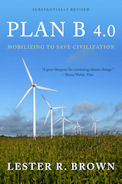
To us at the Earth Policy Institute this year’s festival is of special interest because it features a film on Lester Brown’s Plan B. Produced by Hal and Marilyn Weiner, Emmy-Award winning filmmakers, Plan B (the same title as Lester’s book series) is a 50-minute work-in-progress of a two-part series. The final edition will be aired on PBS stations this fall. The Festival summary notes: “Shot on location in Beijing, Seoul, Tokyo, New Delhi, Rome, Istanbul, Ankara and Washington, DC, the film features Lester’s visit with world leaders to discuss ways to respond to the challenges of climate change. … But what makes Plan B significant and timely is that it provides audiences with hopeful solutions—a road map that will help eradicate poverty, stabilize populations and protect and restore our planet’s fisheries, forests, soils and biological diversity.”
The Weiners have won 130 top international awards from film festivals and their work has received three EMMY Nominations and two EMMY Awards, plus thirty-nine CINE Golden Eagle Awards. They are recipients of the National Academy of Television Arts and Science's 1998 Silver Circle Award for outstanding contributions to the television industry. http://www.screenscope.com/index_alt.html
We are thrilled that the film will soon be seen. For those of you not in the DC area or who can’t make it to see Plan B, when we know the release date for the two-part series, we will send out announcements via our listserv, Tweets, Facebook page, and even this blog. So ... stay tuned!
Meanwhile, for those in the DC area … enjoy the Festival. There’s lots of great films for everyone.
Sincerely,
Reah Janise Kauffman
Vice President
Next: long-established relationships
Page 1 of 1 pages
